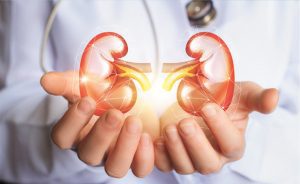 Do you have diabetes? If you are one of the millions of Americans with diabetes or those with prediabetes, you are at a greater risk of a comorbid disorder known as Diabetic Kidney Disease.
Do you have diabetes? If you are one of the millions of Americans with diabetes or those with prediabetes, you are at a greater risk of a comorbid disorder known as Diabetic Kidney Disease.
The National Kidney Foundation published 7 important Diabetic Kidney Disease factors, which are described below:
Diabetic Kidney Disease is a decrease in kidney function that occurs in some people who have diabetes. It means that your kidneys are not doing their job as well as they once did to remove waste products and excess fluid from your body. These wastes can build up in your body and cause damage to other organs.
1. What causes it?
The causes of diabetic kidney disease are complex and most likely related to many factors. Some experts feel that changes in the circulation of blood within the filtering units of the kidney (glomeruli) may play an important role.
2. Who is susceptible to diabetic kidney disease?
Yes. The following risk factors have been linked to increased risk of developing this disease: high blood pressure, poor glucose (sugar) control and diet.
3. I have diabetes. How do I know if my kidneys are affected?
In the early stages, there may not be any symptoms. As kidney function decreases further, toxic wastes build up, and patients often feel sick to their stomachs
and throw up, lose their appetites, have hiccups, and gain weight due to fluid retention. If left untreated, patients can also develop heart failure and fluid in their lungs.
4. How long does it take for kidneys to become affected?
Almost all patients with Type I diabetes develop some evidence of functional change in the kidneys within two to five years of the diagnosis. About 30 to 40 percent progress to more serious kidney disease, usually within about 10 to 30 years.
The course of Type II (adult-onset or non-insulin-dependent) diabetes is less well defined, but it is believed to follow a similar course, except that it occurs at an older age.
5. What can I do to prevent kidney disease?
Careful control of glucose (sugar) can help slow the progression, or perhaps prevent, kidney disease in people with diabetes. You should follow the advice of your doctor and other members of your healthcare team regarding diet and medicines to help control your glucose levels.
6. If my kidneys are already affected, can I keep them from getting worse?
It may be possible to prevent or delay the progression of kidney disease. Since high blood pressure is one of the major factors that predict which diabetics will develop serious kidney disease, it is important to take your high blood pressure pills faithfully if you do have high blood pressure. Your doctor may also recommend that you follow a low-protein diet, which reduces the amount of work your kidneys have to do. You should also continue to follow your diabetic diet and to take all your prescribed medicines.
7. Are there any new treatments that can help me?
Yes. Some studies suggest that a group of high blood pressure medicines called ACE inhibitors may help to prevent or delay the progression of diabetic kidney disease. These drugs reduce blood pressure in your body, and they may lower the pressure within the kidney’s filtering apparatus (the glomerulus). They also seem to have beneficial effects that are unrelated to changes in blood pressure. Patients who take these medicines may have less protein in their urine. SGLT2 inhibitors are a newer class of medicines, some of which can also help reduce the risk of heart or kidney disease in people with diabetic kidney disease. SGLT2 inhibitors can also reduce hospitalization risk from heart failure. Other medicines, such as GLP-1 agonists and MRAs, are also being studied for risk reduction of heart and kidney disease in people with diabetic kidney disease. You may want to speak to your doctor or another member of your healthcare team, to see if these medicines could help you.
Sunshine Kidney Care
Nephrology Associates
352.388.5800
Ste 522 The Sharon Morse Medical Office Building
1400 US Hwy 441N, The Villages FL 32159
Source: https://www.kidney.org/atoz/content/preventkiddisease
 Central Florida Health and Wellness Magazine Health and Wellness Articles of the Villages
Central Florida Health and Wellness Magazine Health and Wellness Articles of the Villages



